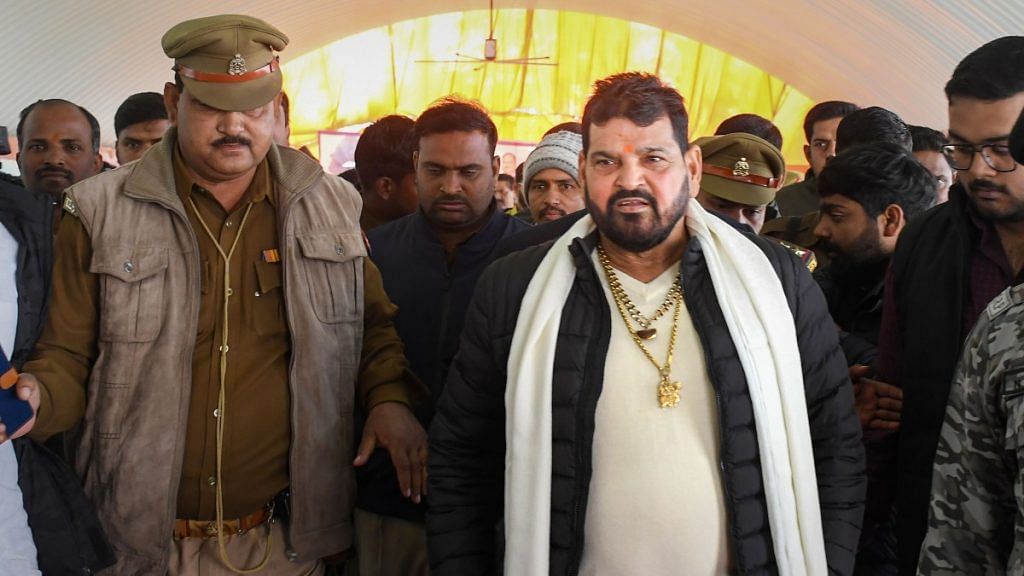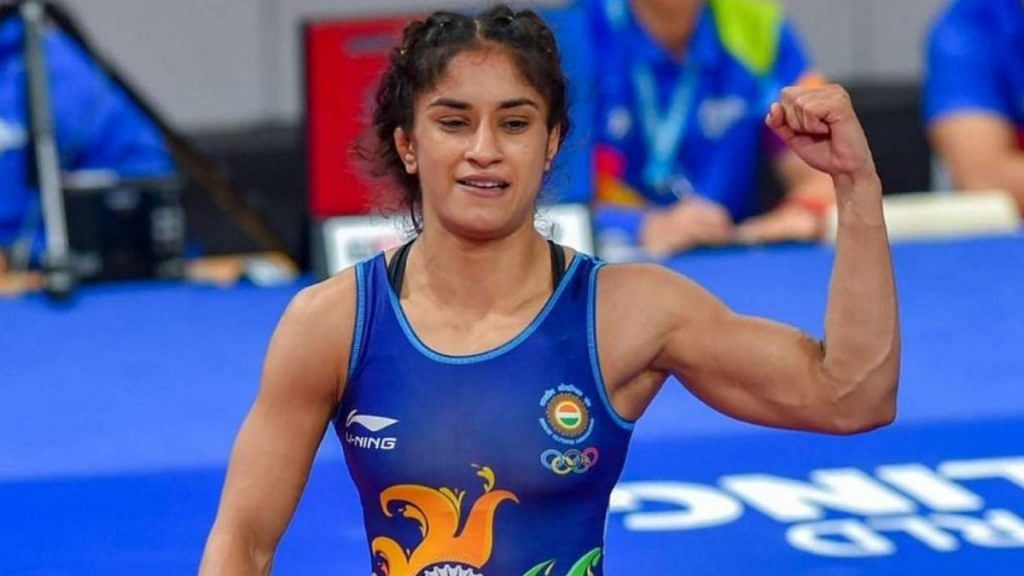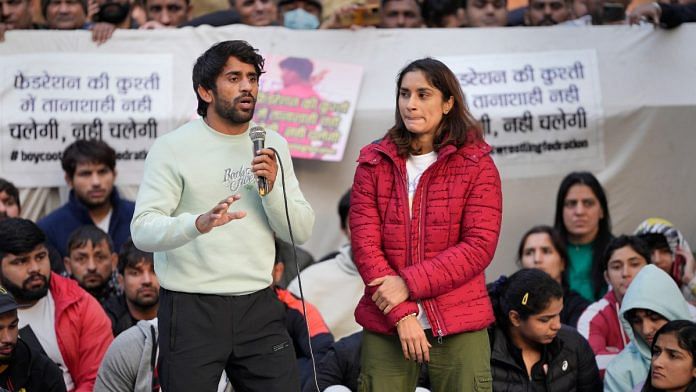New Delhi: When a group of India’s top wrestlers launched a protest against the Wrestling Federation of India (WFI) and accused its president, BJP MP Brij Bhushan Sharan Singh, of sexually harassing sportswomen at national camps, it opened a can of worms about systemic rot in the sport’s governing body.
Olympians Geeta Phogat, Sakshi Malik, and Bajrang Punia came out with their explosive sexual misconduct claims during a three-day protest at Delhi’s Jantar Mantar last week. In a letter to the Indian Olympic Association (IOA), they and other wrestlers also alleged at financial misappropriation in the WFI and claimed that the coaches and sports science staff were “incompetent”.
The WFI, recognised as a National Sports Federation by the Union Ministry of Youth Affairs and Sports, immediately hit back and claimed that the protest was baseless and driven by a “hidden agenda to dislodge the current management”.
Even Singh’s cook apparently entered the melee and filed a petition in the Delhi High Court asking for a case to be lodged against the wrestlers for resorting to “extortion and blackmail” in order to force the WFI president into resigning. Singh has denied he had anything to do with the petition, which has since been reportedly withdrawn.
For the time being, the fight has simmered down. The protest was called off Friday after the government announced that three-time president Singh had been asked to step aside until an oversight committee probes the allegations and submits its report. WFI assistant secretary Vinod Tomar has been sacked for defending Singh in the media and because of allegations of “financial impropriety” against him, Sports Minister Anurag Thakur has said.
The government-appointed committee, headed by boxing champion Mary Kom, will also run the day-to-day activities of the WFI for a month, Thakur announced Monday.
While the panel will complete its probe in due course, the wrangle has thrown the spotlight on not just BJP “strongman” and wrestling “reformer” Singh, but also the WFI.
Here’s a look at how the wrestling body functions, how its members are chosen, as well as some other recent controversies it has been embroiled in regarding its treatment of wrestlers. The Print tried to contact the WFI office via phone, but no response was received. The Delhi Amateur Wrestling Association’s president and vice-president both refused to comment.
Also read: ‘Don of all dons, murderer, wrestling reformer’ — WFI chief & MP Brij Bhushan’s colourful life
What exactly is the WFI?
Formed on 27 January 1967, the WFI is the governing body of wrestling in India. According to its constitution, its mandate is to “promote, encourage and control amateur wrestling activities” and to arrange for the participation of Indian wrestlers in international arenas like the Olympics, the Asian Games, the National Wrestling Championships, and the World Wrestling Championships.
The body is affiliated with state and centrally administered wrestling associations, including the Indian Olympic Association — which is the governing body for India’s national Olympic committee as well as the Commonwealth Games. The WFI is also affiliated with United World Wrestling (UWW), the international governing body for amateur wrestling (earlier also known as Fédération Internationale des Luttes Associées or FILA).
The WFI is one of the over 50 national sports federations (NSFs) recognised by the government of India. This means that it is eligible to receive financial and other forms of assistance from the government.
National sports federations come under the National Sports Development Code of India (NSDCI) 2011, which provides guidelines for granting government recognition to NSFs and also for their suspension and derecognition.
An annual recognition procedure is followed for the NSFs, contingent on them complying with the provisions of the NSDCI, including holding elections on time. This is a measure that is meant to circumvent individuals from turning a sports federation into a personal fiefdom, which has been a recurrent issue in the country.
From akhadas to Olympics
The federation is made up of representatives from state and central bodies and is overseen by the Ministry of Youth Affairs and Sports. WFI oversees all activities related to wrestling in the country, right from villages to the national level.
Every village has an amateur wrestling organisation that is governed by the district bodies. In turn, district bodies are governed by the state bodies, and the state bodies are governed by the elected representative of WFI.
Ajit Singh, a former Sports Authority of India coach, explained how the WFI regulates wrestling across the country.
“For example, if there are 500 villages in Rohtak district, what needs to be seen is whether each village has an akhada (traditional wrestling ground and training centre). The akhada is then affiliated to the state body and the state body is affiliated to the national federation,” he said.
The WFI, he indicated, is Indian wrestlers’ link to the world since it is “is affiliated with the international federation which is the United World Wrestling, which is affiliated with the International Olympic Association.”
A March 2022 article on the ESPN India website pointed out that the WFI wields inordinate power over wrestlers, especially since they usually compete as part of a national team and require permission from the body to participate.
Although there are exceptions in the case of high-profile sportspersons like Phogat and Punia, the WFI exerts control on the coaching, physiotherapy, and competitions that a wrestler has access to, the article noted. In general, it added, “[i]f the federation suspends a player, there’s no way for them to compete internationally.”
Who are the members?
The membership of WFI is open to the wrestling associations of the states and Union territories, the Services Sports Control Board, the Railway Sports Control Board, and UWW’s bureau and associate members, the body’s constitution says.
Membership is approved by the WFI’s general council, which is the technical and administrative body of the federation. The wrestling associations of the states as well as the Delhi Amateur Wrestling Association (DAWA) are entitled to send two representatives to the general council, each with one vote. The UT wrestling federations (other than DAWA) can send one representative with one vote.
The general council is responsible for electing the members of the executive committee, which has been at the centre of the latest controversy. The executive committee comprises the president, vice-presidents, secretary-general, treasurer, and so on.

Twenty-five per cent of the executive committee comprises sportspersons — two men and two women — who are elected by the general council from among its members.
This committee is responsible for the proper supervision of teams, overseeing finances and accounts, dealing with disciplinary issues, and making recommendations for the promotion and development of amateur wrestling to the general council, among other things.
How are president and office-bearers elected?
Elections for the office-bearers and executive committee members of the WFI are held every four years in the general council meeting, per the model election guidelines of the sports ministry.
For the post of president in WFI, representatives from each state and Union territory can file their nominations. In case of a single candidate, the elections aren’t held and the nominated candidate is elected to the position unanimously.
If there’s more than one candidate, an electoral procedure is undertaken via a secret ballot in the presence of representatives from the Indian Olympic Association and the Ministry of Youth Affairs and Sports, who act as observers. No representative can contest elections after three consecutive terms, or 12 years.
The current president, Brij Bhushan Sharan Singh, was first elected in 2012, when he beat Congressman Deepender Hooda to the post.
This was the start of an over decade-long reign. In 2019, Singh was elected unopposed for the third time as WFI president. Other office-bearers were elected unopposed that year too.
A BJP MP from UP’s Kaiserganj, Singh is also the vice president of the Asian council of UWW.
Tightening control on players?
The sexual harassment allegations are the most serious charge yet to be levelled at the WFI, but the wrestling body is not new to controversy.
In March last year, for instance, Bajrang Punia had claimed that the WFI denied him a physiotherapist after the Olympics for his knee injury, due to which he was not able to participate in some events. The WFI’s Tomar, who was sacked in the aftermath of the current controversy, had claimed that the body had agreed to give Punia a physiotherapist but that the one that the wrestler “desired” was not available.
Similarly, Vinesh Phogat had alleged that her physiotherapist was not allowed to travel with her for the Tokyo Olympics last year, due to which her performance suffered. To this, Tomar had said reportedly said that “a physiotherapist not being there for a day makes no difference to the performance on the mat”.

WFI president Singh had also claimed that wrestlers were being “spoiled” by non-profit sports NGOs like Olympic Gold Quest (OGQ) and JSW, which had given coaching and physio support to some grapplers. Such NGOs should “leave our wresters and Indian wrestling alone,” Singh had said.
The ESPN article cited earlier reported that the WFI had “tightened control” on wrestlers and mandated that “all contracts signed by wrestlers with potential supporting organisations now have to be approved by them… There are also limitations in the kind of support that can be offered to wrestlers.”
Notably, ten women wrestlers, including Commonwealth Games gold medallist Geeta Phogat, were barred from competing in the Asian Championships selection trials last year because they did not attend the national camp in Lucknow, or did not stay for its entirety.
(Edited by Asavari Singh)
Also read: ‘Daughter, a curse?’ Olympians question PM’s silence on #MeToo charges against WFI chief



